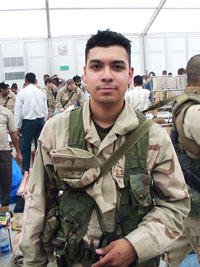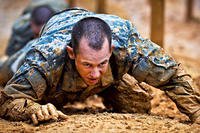Marine Corps veteran Edgar Navarro owns and runs a franchise under the company Cell Phone Repair (CPR). We talked with Navarro and company CEO Jeremy Kwaterski about opportunities in tech and franchising, and what veterans can do to prepare themselves for this career.
Interview with Edgar Navarro:
Military.com: Can you tell us briefly about your military experience?
Edgar Navarro: "My experience was that of many other Marines. Choosing the right career path was very important to me; I chose to go into the repair side, specifically telecommunications. I went for schooling in Twentynine Palms, California, and was quickly stationed in Camp Lejeune, N.C. I deployed to Kuwait in 2003 and again in 2005.
"Both tours were very different from each other, and my experience went from not only doing the repairs but also assigning them to my Marines. I quickly gained the experience I was looking for, and by my second trip to Iraq, I had reached the rank of sergeant and been awarded two Navy and Marine Corps Achievement Medals. During my enlistment, I attended Southern Illinois University. I took many electronic theory and management courses that aided my decision to become a business owner."
Military.com: Can you talk about your transition to your current career? Was this something you knew you wanted to do immediately upon separation, or did you pursue other opportunities before coming to CPR?
EN: "Upon exiting the Marines, I had the experience, knowledge and motivation to accomplish anything; unfortunately, I had no direction. I did not know what type of industry I wanted to go into. I did want to become my own boss; that was clear. I went back to my old job before the Marines -- as many other retired service members do -- as a waiter and server.
"This quickly became my motivation to get into the business lane. In a very serendipitous fashion, I accidently broke my phone after work and was in need of a replacement. I called my carrier and was told they could not do anything for me, since my contract was not up for renewal. They mentioned CPR as an option, I quickly stopped on in, and two weeks later, I was in my new job as a cell phone technician, but more importantly, it was the beginning of a life-changing decision."

Military.com: What were the skills you learned in the military that turned out to be useful in your new career?
EN: "Throughout the ranks, you learn time management, people management and discipline. I would easily say that people management was the most important skill I learned, knowing your strengths and weaknesses and placing the right people in the right place to become successful. The technical training I received in the Marines was a great base education. A complete electronic course, with a specialty in telecommunication, which included both phone and computers, really prepared me for this business."
Military.com: What was the biggest challenge you faced in becoming a business owner? What skills did you have to pick up that you hadn't had experience with before?
EN: "My biggest challenge was choosing the right business to be in, finding what makes me happy and choosing it as a life-changing decision. The other obvious challenge was funding for the business. I was very happy to hear about the Patriot Act, [which] helped me secure a loan to pursue my dream.
"The Veterans Affairs office was a great tool to learn about my options for funding as well. There are many things that I still have to learn about running a business, accounting skills mainly. The great part of a franchise is that there is a great support system in place to help people like me who are new to the 'business mind.'"
Military.com: Can you describe a typical "day in the life" of running your business?
EN: "Running a business is like clockwork; when everything is timed just right, it's a great day. We open at 10 a.m. and start off by going over the previous day's work to verify the repairs are completed. We then meet and greet customers who are coming in after hearing of our services from all the cellular carriers like AT&T, T-Mobile and Verizon.
"I assign the repairs to my employees as they come in; some are based on their strengths to expedite the repair and maximize efficiency. On a typical day, I would say we go through an average of 20+ repairs. We place our parts order very easily through our online parts warehouse, CPR Direct, to satisfy our customers' needs. Toward the latter part of the workday, I go through our current day's invoicing and run a comparable report from the previous months to look at market trends."
Military.com: Can you talk about the support and resources that CPR has provided to you?
EN: "CPR has been great in my support needs. They not only support me in the technical field for repairs but also in helping my business reach other forms of income and services. They have quite a few tools available to franchisees that help us in many different ways. We have an amazing network of technicians participating in our CPR forum, which gives advice and tips on repairs, store operations and marketing, just to name a few.
"CPR locations are also assigned two corporate members to assist me; one is a technical manager, and the other is an operations manager. They constantly reach out to me or my employees to assist in their needs and to give us follow-up training when in need of it. When in doubt, all I have to do is call one number to find my answers. This makes it easy to run a business and trust that someone is always there to help."
Military.com: For other veterans who might be interested in franchising or a technical career, what advice would you have for them? Looking back at your own transition experiences, is there anything you could have done to make your path easier?
EN: "It took me about two years after I got out of the Marines to decide what my future held for me and what decision I had to make. The only change I would have made [and advice I would give to anyone] is to not wait too long. Make your move while you still have that passion, motivation and desire to make something good.
"Take advantage of the programs the VA offers, and look into other grants that are available to you to make your dream of owning a business come true. Choose a path that you are comfortable and happy with; do what makes you happy, and it will never feel like work.”
Interview with Jeremy Kwaterski, CEO of Cell Phone Repair:
Military.com: Can you tell us about CPR and the franchising opportunities that are available?
Jeremy Kwaterski: "CPR is the largest retail gadget repair business in the United States with over 100 locations, and [it] has been franchising since 2005. CPR was rated one of the top 50 fastest-growing franchises in the U.S. by Entrepreneur Magazine and was also recognized as one of the top seven tech franchises in the industry.
"We repair all types of electronic devices -- from cell phones to tablets, laptops, mp3 players, game systems, GPS devices, PDAs [personal digital assistants] and more right in our stores. We stand out among the competition, because we have a professional team of Gadget Tech repair specialists at each store, and we are committed to providing great customer experiences."
Military.com: Can you talk about the skills and positives that veterans like Edgar bring to your franchises?
JK: "Veterans bring a large number of great skills to the table as potential franchise owners, like the ability to work as part of a team or multi-task effectively. Our veteran owners are smart, savvy business people with the knowledge and people skills necessary to make their locations a great success. We see veterans as ideal candidates for the CPR team."
Military.com: How does the future look for franchise opportunities with CPR?
JK: "Amazing! We have over 300 locations sold and slated to open over the next few years, and lots of areas and opportunities are still available for single-unit owners, multi-unit owners and area developers. Our growth has been 100% per year for the last couple of years, and we are excited by the constant influx of new technologies into the market. There has never been a better time to become a CPR owner."
Military.com: Do you have any advice for veterans who are interested in pursuing a franchise or specializing in this career field as they make their transition to a civilian career?
JK: "The technology industry is one of the best industries for veterans, because it is constantly changing and the growth potential is almost unlimited. The most positive aspect of buying into a franchise vs. starting your own business from scratch is that with a franchise, you have the support of a professional team and the basic operations of the business already in place.
"CPR has a support network that is spread out throughout the U.S., and that kind of support can be vital to a new owner, especially a new owner that is making a second transition to a civilian career. Also, check into your local GI office; they can help in the financing process through the SBA [Small Business Administration].”
Want to Know More About the Military?
Be sure to get the latest news about the U.S. military, as well as critical info about how to join and all the benefits of service. Subscribe to Military.com and receive customized updates delivered straight to your inbox.











